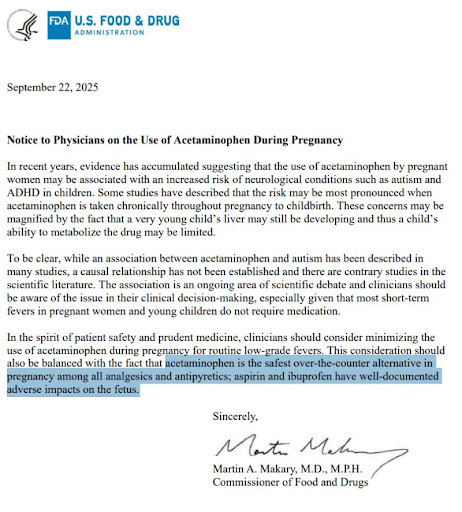Here’s what you need to know about the administration’s statement that ”taking Tylenol is not good” for pregnant women
If you haven’t heard the chatter around Tylenol and if pregnant women should or should not take it, below is a high level overview.
Breaking it down
The Trump administration recently announced that they are issuing a warning to doctors not to recommend acetaminophen, which is the active ingredient in Tylenol, and the safest pain reliever for pregnant women to take.
Let’s take a look at what we know based on research to-date.
Here are the facts about acetaminophen risk in pregnancy:
Some studies show a potential correlation between acetaminophen use and risk of autism.
The administration’s recommendation is centered around select research including Prada et al.’s (2025) review of 46 studies, where 27 studies show an association between use of acetaminophen and autism, but no findings of causation. In other words, there was no proof in this review that taking acetaminophen while pregnant directly led to the child having autism, but researchers did see a relationship between the two.
The Prada et al.’s (2025) review also takes into consideration that the women taking acetaminophen or Tylenol during pregnancy needed to take it for a reason, i.e. high fever, infection, pain, etc. They adjusted the risk factor for these indications, meaning they took into consideration that the reason the mother took acetaminophen (high fever, infection, etc.) may itself increase the risk of neurodevelopmental disorders, including autism. This furthers its evidence that there is an association, but no proof of causation. (1)
Additionally, according to Ahlqvist et al.’s (2024) study on acetaminophen use affecting a child’s risk of neurodevelopment disorders, there is significant evidence that there is no direct relationship between the two. In fact, when this data was re-analyzed to control for genetics (i.e. one sibling had exposure to acetaminophen in utero and one did not) the association disappeared completely. (2)
Autism is complex, and there’s no single cause.
Factors include genetics, parental age, and environment. (3)
The number of autism cases have increased from 1:150 to 1:31 in the last 25 years, but there are a number of factors to consider:
We define autism a lot more broadly now, following changes in the definition of autism in both 1994 and 2013 (4)
We now have better screening tools available, so it’s easier to diagnose someone with autism, and they can get the support they need (5)
Autism is becoming more recognized and accepted (6) (previously, many autistic people went undiagnosed)
We know this information is a lot to consider if you’re pregnant or planning to become pregnant.
Given the administration’s recommendation to avoid acetaminophen, you may be wondering if it’s worth taking Tylenol at all during pregnancy. While the evidence above points to association with no determination that Tylenol causes autism, we also understand that many prospective parents want to reduce as many risks as possible.
According to The American College of Obstetricians and Gynecologists (ACOG), acetaminophen is still the safest pain reliever and fever reducer to use during pregnancy. In fact, the ACOG also states that “failing to treat medical conditions that warrant the use of acetaminophen, such as maternal fever, persistent headaches, and pain, can be dangerous. When left untreated, these conditions can in some cases create severe risk of harm or death for the pregnant person and the fetus.” (7)
A pregnant Folia team member’s take:
We asked a member of our Folia team, who is expecting a baby early next year, how she’s navigating these updated recommendations. Here’s how she’s considering the risks:
“Of course, my baby’s health is top priority, and I want to reduce risks as much as possible. Will I be popping Tylenol at the slightest indication that I might need it during my pregnancy? Probably not. That being said, given that the current evidence does not suggest that Tylenol specifically causes autism, I will plan to follow ACOG’s guidance and will talk to my doctor about taking it in situations where I think it’s needed (if I’m in severe pain, have a fever, or another health issue comes up where acetaminophen can help reduce severe known risks to me or my baby).
I also realize many people live with chronic symptoms and going 9 months without any sort of pain relief is not realistic. If I was in a situation where I needed Tylenol to manage chronic symptoms like pain or migraines, I would likely continue using it as needed, in line with my doctor’s recommendations.
Ultimately, I trust my medical professionals to help me make the best choice given the situation at hand– and that’s the most we can do as parents-to-be.”
As no person’s health or pregnancy is the same as another, here’s the most important thing: we strongly recommend you speak with your doctors and care team about your specific situation if you’re uncertain about what to do.
Have other questions about this news? Drop them in the comments so we can do the research for you!
References:
Prada, D., Ritz, B., Bauer, A.Z. et al. Evaluation of the evidence on acetaminophen use and neurodevelopmental disorders using the Navigation Guide methodology. Environ Health 24, 56 (2025). https://doi.org/10.1186/s12940-025-01208-0
Ahlqvist VH, Sjöqvist H, Dalman C, et al. Acetaminophen Use During Pregnancy and Children’s Risk of Autism, ADHD, and Intellectual Disability. JAMA. 2024;331(14):1205–1214. doi:10.1001/jama.2024.3172
Parshall, A. (2025, September 10). Autism has no single cause. Here’s how we know. Scientific American. https://www.scientificamerican.com/article/autism-has-no-single-cause-research-shows/
David Rosen, Catherine Lord, Fred R. Volkmar, and others, “The Diagnosis of Autism: From Kanner to DSM-III to DSM-5 and Beyond,” Journal of Autism and Developmental Disorders 51, no. 12 (2021): 4253–4270, https://doi.org/10.1007/s10803-021-05237-4
Autism Speaks. (2025, April 15). Autism prevalence rises to 1 in 31 children in the U.S. https://www.autismspeaks.org/science-news/autism-prevalence-rises-1-31-children-us
Public Health On Call, “Is There an Autism Epidemic?,” Johns Hopkins Bloomberg School of Public Health, June 6, 2025, https://publichealth.jhu.edu/2025/is-there-an-autism-epidemic
American College of Obstetricians and Gynecologists, “Acetaminophen in Pregnancy,” Physician FAQs, ACOG, 2025, https://www.acog.org/clinical-information/physician-faqs/acetaminophen-in-pregnancy

